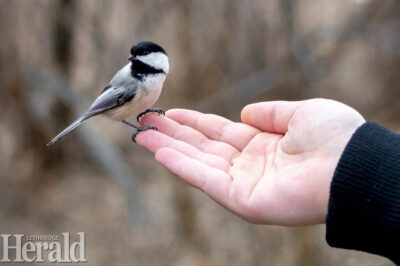Hand feeding birds can have negative consequences for both birds and people, nature centre warns
By Ry Clarke - Lethbridge Herald Local Journalism Initiative Reporter on October 20, 2022.
 Herald file photo
A chickadee alights on the empty hand of a river valley visitor in the winter of 2021. Staff at the Helen Schuler Nature Centre are warning that hand feeding birds can have negative consequences for both birds and people.
Herald file photo
A chickadee alights on the empty hand of a river valley visitor in the winter of 2021. Staff at the Helen Schuler Nature Centre are warning that hand feeding birds can have negative consequences for both birds and people.The City of Lethbridge is issuing a warning about interacting with wildlife.
The Helen Schuler Nature Centre has received an increase in reports from the community about people feeding wild birds by hand in Lethbridge’s parks, and they also noted staff have witnessed an increase in social media posts featuring people hand feeding wildlife.
“What we are noticing is that the birds that are being hand fed are smaller birds, like chickadees, nuthatches, and woodpeckers,” said Jessica Deacon-Rogers, program coordinator with the Nature Centre. “At this time of year, those birds are looking for seeds and berries, they cash or hide seeds in different places for stores throughout the winter. One of the issues with people feeding them is that those birds are not getting the diet that they necessarily need. Birds are eating a variety of foods from the natural environment around them, so their diet varies with this season. The best diet for birds is the natural diet.”
The Nature Centre would like to remind residents, while it may seem exciting to be engaging in this activity, it actually has negative consequences for both the birds being fed, and park users.
“The other issue that we are having is that some birds are becoming quite aggressive in looking for food,” said Deacon-Rogers. “Because they have been hand fed, they are following people along the trails and actively flying up in people’s faces trying to land on their shoulders or hands seeking food.”
Deacon-Rogers notes that feeding birds in this manner also puts them in danger of prey.
“When people are hand feeding them, they are moving out into open areas,” said Deacon-Rogers. “Small birds would spend time in shrubs and trees hiding, because they are susceptible to predators. Falcons and hawks will often eat small birds. When people are hand feeding birds, they are feeding them on the edge of trails and parking lots or open grassy areas.”
For those looking to still enjoy the wildlife of the area, there are many ways to interact, including bird-watching, while being respectful of their environment.
“I would suggest, if you are able to, in your backyard or patio planting shrubs or trees like chokecherry or saskatoon that have berries on them,” said Deacon-Rogers. “You can watch them from your window, you are not going up close to the birds, so they are not getting used to people being around. Because they still have to have that fear of people, which is really important to keep them safe.”
She also pointed out having water sources for birds, like a well or birdbath, are helpful for finding food and water in urban areas.
“I encourage people to learn more about the birds that we have in our area. The Nature Centre here has some fantastic resources about local bird species,” said Deacon-Rogers.
12-11




